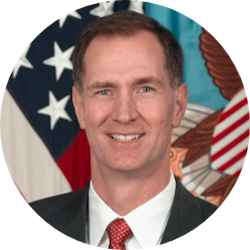World Order after Covid-19 Forum
Technology, Economics, and Climate in the Post-COVID World
Wednesday, July 1
10:00 a.m. – 11:15 a.m. (EDT)
PANELISTS
Christine H. Fox
Assistant Director, Policy and Analysis, Johns Hopkins Applied Physics Laboratory (APL)
John Lipsky
Peter G. Peterson Distinguished Scholar, Henry A. Kissinger Center for Global Affairs; Senior Fellow, Foreign Policy Institute, Johns Hopkins SAIS
James N. Miller, Chair
Senior Fellow, Johns Hopkins Applied Physics Laboratory (APL)
Thayer Scott
Consultant, Johns Hopkins Applied Physics Laboratory (APL)
Benn Steil
Director of International Economics, Council on Foreign Relations
Johannes Urpelainen
Director and Prince Sultan bin Abdulaziz Professor of Energy, Resources and Environment, Johns Hopkins SAIS
PARTICIPANT BIOS

Assistant Director, Policy and Analysis, Johns Hopkins Applied Physics Laboratory (APL)
The Honorable Christine Fox is Assistant Director for Policy and Analysis at the Johns Hopkins Applied Physics Laboratory, a position she has held since 2014. Previously, she served as Acting Deputy Secretary of Defense from 2013 to 2014 and as Director of Cost Assessment and Program Evaluation (CAPE) from 2009-2013.
As Director, CAPE, Ms. Fox served as chief analyst to the Secretary of Defense. She officially retired from the Pentagon in May 2014. Prior to her DoD positions, she served as president of the Center for Naval Analyses from 2005 to 2009, after working there as a research analyst and manager since 1981. Ms. Fox holds a bachelor and master of science degree from George Mason University.

Peter G. Peterson Distinguished Scholar, Henry A. Kissinger Center for Global Affairs; Senior Fellow, Foreign Policy Institute, Johns Hopkins SAIS
John Lipsky is the Peter G. Peterson Distinguished Scholar at the Henry A. Kissinger Center for Global Affairs of Johns Hopkins University’s Paul H. Nitze School of Advanced International Studies (SAIS) in Washington, DC. He also is a Senior Fellow of SAIS’s Foreign Policy Institute.
Prior to joining SAIS in January 2012, Mr. Lipsky had served a five-year term as the International Monetary Fund’s First Deputy Managing Director. During May-July 2011, Mr. Lipsky was the IMF’s Acting Managing Director. Prior to joining the IMF as First Deputy in September 2006, Mr. Lipsky had been Vice-Chairman of the JPMorgan Investment Bank. Previously, he had been JPMorgan’s Chief Economist, after having served as Chief Economist and Director of Research for Chase Manhattan Bank. Before joining Chase in January 1997, Mr. Lipsky spent thirteen years at Salomon Brothers – the last five as Chief Economist – following a decade at the IMF.
Mr. Lipsky currently serves as Co-Chair of the Aspen Institute’s Program on the World Economy, as Vice Chair of both the National Bureau of Economic Research and of the Center for Global Development. He also is a Director of the Center for Global Development Europe, and of the American Council on Germany, and a member of the Advisory Board of the Stanford Institute for Economic Policy Research (SIEPR). Mr. Lipsky is a Life Member of the Council on Foreign Relations. He received a B.A. in Economics from Wesleyan University, and a Ph.D. in Economics from Stanford University.

Senior Fellow, Johns Hopkins Applied Physics Laboratory (APL)
Dr. James N. Miller is president of Adaptive Strategies LLC, a senior fellow at Johns Hopkins University’s Applied Physics Laboratory, and a member of the Defense Science Board. As under-secretary of defense for policy from 2012 to 2014, Dr. Miller served as the principal civilian advisor to the secretary of defense on strategy, policy, and operations, working to strengthen relations with allies and partners in Europe, the Middle East, and Asia, and to reduce the risks of miscommunication with Russia and China. He served as principal deputy under-secretary of defense for policy from 2009 to 2012.

Consultant, Johns Hopkins Applied Physics Laboratory (APL)
Thayer Scott is a writer and consultant affiliated with the Johns Hopkins Applied Physics Laboratory since 2018. Previously he worked in communications and government affairs positions for The Boeing Company and Lockheed Martin. From 2004 to 2011 he served in the U.S. Department of Defense – from 2007 onward as Chief Speechwriter for Secretary of Defense Robert Gates.
Earlier he was Director of Communications for the International Republican Institute, an independent organization promoting democratic values and governance. Mr. Scott has a B.A. from Princeton University and a M.S. from University of California-Berkeley. After college he served on active duty in the U.S. Army as a Field Artillery officer.

Director of International Economics, Council on Foreign Relations
Benn Steil is senior fellow and director of international economics, as well as the official historian in residence, at the Council on Foreign Relations in New York. He is also the founding editor of International Finance, a scholarly economics journal; lead writer of the Council’s Geo-Graphics economics blog; and creator of six web-based interactives tracking Global Growth, Global Monetary Policy, Global Imbalances, Sovereign Risk, Central Bank Currency Swaps, and China’s Belt and Road Initiative.
Prior to his joining the Council in 1999, he was director of the International Economics Programme at the Royal Institute of International Affairs in London. He came to the Institute in 1992 from a Lloyd’s of London Tercentenary Research Fellowship at Nuffield College, Oxford, where he received his MPhil and DPhil (PhD) in economics. He also holds a BSc in economics summa cum laude from the Wharton School of the University of Pennsylvania.
Dr. Steil has written and spoken widely on international finance, monetary policy, financial markets, and economic and diplomatic history. He has testified before the U.S. House, Senate, and CFTC, and is a regular op-ed writer and commentator on CNBC. His most recent book, The Marshall Plan: Dawn of the Cold War, won the New-York Historical Society’s 2019 Barbara and David Zalaznick Prize for best work on American history, won the American Academy of Diplomacy’s 2018 Douglas Dillon Prize, won the Honorable Mention (runner-up) for the 2019 ASEEES Marshall D. Shulman Prize, was shortlisted for the Duff Cooper Prize, and is ranked number 3 among Book Authority’s Best Diplomacy Books of All Time. Paul Kennedy in the Wall Street Journal called the book “brilliant,” the New York Times called it “trenchant and timely,” the Financial Times called it “elegant in style and impressive in insights,” and the Christian Science Monitor called it a “gripping, complex, and critically important story that is told with clarity and precision.” His previous book, The Battle of Bretton Woods: John Maynard Keynes, Harry Dexter White, and the Making of a New World Order, won the 2013 Spear’s Book Award in Financial History, took third prize in CFR’s 2014 Arthur Ross Book Award competition, was shortlisted for the 2014 Lionel Gelber Prize (“the world’s most important prize for non-fiction,” according to The Economist), and was the top book-of-the-year choice in Bloomberg’s 2013 poll of global policymakers and CEOs. The Financial Times called the book “a triumph of economic and diplomatic history,” the Wall Street Journal called it “a superb history,” the New York Times called it “the gold standard on its subject,” and Bloomberg’s Tom Keene called it “the publishing event of the season.” An earlier book, Money, Markets, and Sovereignty, won the 2010 Hayek Book Prize.

Director and Prince Sultan bin Abdulaziz Professor of Energy, Resources and Environment, Johns Hopkins SAIS
Johannes Urpelainen is the Director and Prince Sultan bin Abdulaziz Professor of Energy, Resources and Environment at Johns Hopkins SAIS and the Founding Director of the Initiative for Sustainable Energy Policy (ISEP). He received his PhD in Political Science from the University of Michigan in 2009 and spent the next eight years at Columbia University.
Johannes is the award-winning author of four books and over a hundred refereed articles on environmental politics, energy policy, and global governance. He teaches action-oriented classes on energy and environmental policy to equip the next generation of global leaders with deep knowledge, advanced analytical skills — and a passion for transformational social change. As one of the world’s top energy policy experts, Johannes frequently advises governments, international organizations, and the private sector on energy and environment.
As the Founding Director of ISEP, Johannes is responsible for the vision, strategy, and general management of the initiative. His work under ISEP offers pragmatic but effective approaches to providing the world’s population with affordable and abundant energy at minimal environmental impact. In his spare time, Johannes reads biographies and tries to improve his Hindi.